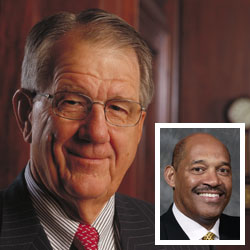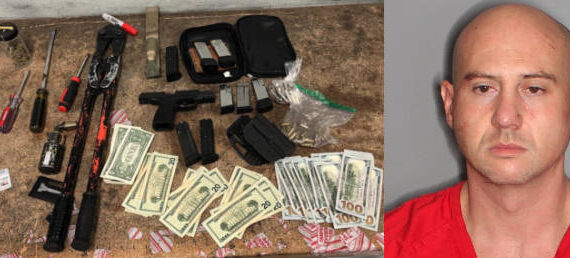In a move that suggests that Boeing has gone from one ethical extreme to another, the scandalized aerospace giant this week fired Chief Executive Officer Harry Stonecipher for having an office affair. The personal transgression breeched a corporate code of conduct the CEO was brought aboard to enforce, Boeing announced. Stonecipher’s ouster comes 15 months after the forced resignation of CEO Phil Condit, whose seven-year reign was plagued by ethical lapses in dealings with Pentagon contracts. In effect, Condit was fired while making war; Stonecipher was ousted for making love.
The object of his affection was first identified by BusinessWeek on its Web site and later in The Wall Street Journal as 25-year Boeing employee Debra Peabody, a vice president in the company’s D.C. offices. Peabody, 48, formerly worked at the company’s headquarters in Seattle and, later when the corporate headquarters was moved in 2001, in Chicago. The Journal reported that Stonecipher and Peabody exchanged sexually graphic e-mail that was turned over to company officials by a unidentified whistleblower. Peabody first met Stonecipher in January at Boeing’s annual executive retreat in Palm Desert, Calif., BusinessWeek said, quoting executives who were present.
Chicago-based Boeing said that Stonecipher, 68 and married, had an ongoing relationship with Peabody, a divorcee, who was not fired. The affair apparently had no effect on Boeing business, officials said. “Harry was asked to resign by the board because he clearly violated our code of conduct,” Board of Directors Chair Lew Platt told reporters Monday, March 7. Those actions, he said, could have “compromised” the company’s business standards.
James Bell was appointed interim president and CEO. Bell, 56, was Boeing’s chief financial officer, having succeeded Michael Sears, who was recently sentenced to prison.
Peabody earned her MBA at the University of Washington, which features her in a business school promotional brochure in which she stated: “When I enrolled in the [executive MBA] program, my company recognized that I was interested in improving and challenging myself …” According to company information, Peabody was hired by Boeing as an engineer in 1980. She has worked in Boeing’s London office and was international sales director for Connexion, the Boeing division that supplies satellite Internet and broadcast links to government and commercial aircraft. As vice president for Boeing’s lobbying operations in D.C., her duties have included overseeing the relocation of Ronald Reagan’s Air Force One Boeing 707 to the Reagan presidential library in California. Her boss, Rudy DeLeon, Boeing’s chief lobbyist and onetime deputy secretary of defense, led the company’s effort to salvage the Air Force tanker deal that became one long ethics failure and prompted Stonecipher’s hiring to set things right (see “‘Embarrassing Don’,” Dec. 1, 2004).
In a news release that did not name Peabody, Boeing said “neither the career nor the compensation of the female executive was influenced by this relationship.” It was a consensual affair, Boeing said.
Stonecipher, a retired Boeing executive who was rehired in 2003 to polish the corporate image, was always thought to be a short-timer. “When Harry became CEO we, of course, began to think a lot about succession, since it was clear that Harry would not be in the job for many years but instead for a few years,” said Platt. But he lasted little more than one year.
Platt spoke obliquely about why a company with so many critical ethics problems felt its ranking executive deserved to be sacked for an office dalliance. An “anonymous employee” tipped the company, Platt said. Following an investigation, “We saw things surrounding the relationship that we thought were potentially embarrassing.”
When Stonecipher’s predecessor, Condit, was ousted in 2003, the primary cause was the Air Force tanker lease scandal—a potential $17-billion-plus contract for aerial-refueling tankers derived from the 767, which is built at Boeing’s Everett commercial-airplane factory. That deal with the Pentagon has since been scrapped. Condit had just fired CFO Sears and fellow executive and onetime Pentagon official Darleen Druyun for “misconduct” in connection with the tanker lease—conduct that sent both Sears and Druyun to jail. Condit’s departure was a dramatic coda to a series of scandals that included a 20-month ban on bidding for Air Force rocket contracts—a ban lifted only last Friday, March 4. In Condit’s seven years, Boeing racked up more than $100 million in fines and settlements for federal violations.
Boeing once had 80 percent of the commercial jetliner market and once had its headquarters in Seattle. It lost domination to the European consortium, Airbus, in recent years. But it has been rebounding financially and, it has seemed, ethically. Stonecipher’s priority appeared to be cleaning up Boeing’s act and steering it toward new profit in the race with Airbus.
One of Stonecipher’s first predictions proved to be badly off the mark, however: “I would expect the [tanker] investigation would last a couple of months,” he said after taking over in 2003, “maybe a little less.” In fact, by the end of 2004, a number of still-ongoing civil and criminal probes had doomed the contract, and the future of the 767 Everett line is now in question. But in the end, said Boeing, it all came down to style. “The board concluded that the facts reflected poorly on Harry’s judgment and would impair his ability to lead the company,” Platt said of the affair.
Ironically, the scandals that helped drag down Condit might also have nailed Stonecipher. Stonecipher and others may have raised the ethical bar so high that a once-minor transgression has been elevated to felonylike status. As Platt put it in an interview with CNBC: “It’s a new time in American business where everyone is held to a pretty high standard.”








